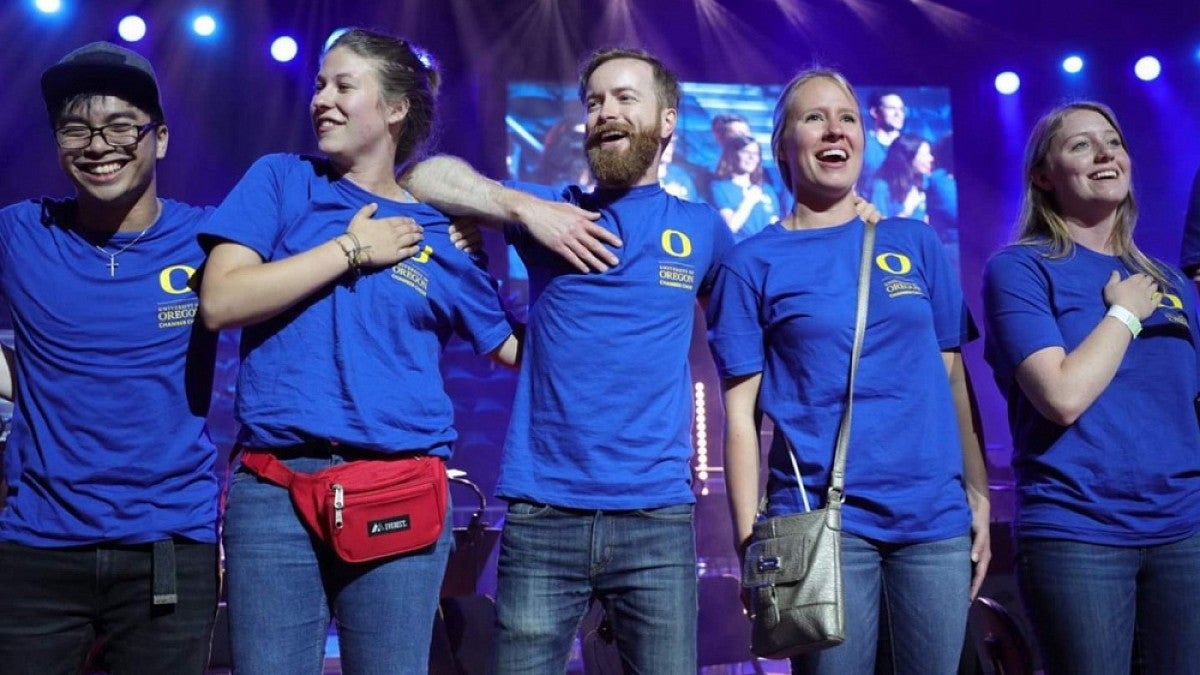The University of Oregon Chamber Choir has won top honors at one of Europe’s most prestigious choral competitions.
The group was awarded first place in the chamber choirs/vocal ensemble category at the Grand Prix of Nations in Gothenburg, Sweden, earlier this month, beating out 15 other choirs from around the world with a score of 96.65 out of 100.
“Our goal going into the competition was to break the score of 90, because that is considered a gold medal, top-level performance,” said Sharon J. Paul, choir director and professor of music at the School of Music and Dance.
It was a nail-biting win, with a margin of victory of just 0.15 points over the second-place winner, a choir from a music conservatory in Moscow.
“It was magical, because you could hear our students just explode with applause,” said Sabrina Madison-Cannon, the Phyllis and Andrew Berwick Dean at the School of Music and Dance. “I was so proud of them, and I was so happy that they were acknowledged for the really hard work that had gone into honing their repertoire.”
The students were invited onstage at the packed auditorium to lead the audience of thousands in singing the national anthem.
“It was just very emotional and powerful,” Madison-Cannon said.
Being honored on the international stage was an unforgettable experience for the students.
“We were just elated, and everyone cried when we realized that we won,” said Naomi Castro, a master’s student in choral conducting from Hawaii. “I’m still on cloud nine. I don’t even know if I’ve fully digested what actually happened.”
For some students, such as senior Alycia Thatcher, it was their first time competing at the international level.
“It’s a huge accomplishment, and I’m just super proud and blessed that I could be a part of it,” said Thatcher, a vocal performance major from Eugene.
The competition was the culmination of a four-city tour of Sweden, which also included performances at historic venues in Stockholm, Örebro and Jönköping, as well as educational side trips to castles, museums and cultural landmarks.
“When you study choral music, you learn so much more than just about music,” Paul said. “You have to study poetry. You have to study languages, because they had to sing in all these different languages. And you have to analyze the poetry to find the musical rhetoric. There’s so much deep thinking that goes into all of that.”
The tour also gave students the opportunity to see the benefits of Scandinavia’s famously egalitarian social system first hand.
“It is possible to have free health care and free college,” said Robert Bohall, a jazz composition major from Newberg. “The people are very warm and nice, and the coffee’s amazing. You can’t beat it. It was really cool talking to the locals, and more than half of the people in Sweden have recreationally been in a choir. That’s kind of a cool fact.”
Madison-Cannon said she was proud of the students’ professionalism throughout the tour.
“They were such great ambassadors, not just for our school, but for our country,” she said.
Paul said one of her favorite moments happened after a friendship concert with choirs from Russia and Israel, when the students started spontaneously singing and dancing together with members from the other groups.
The multicultural exchange included impromptu renditions of “Somewhere Over the Rainbow,” Leonard Cohen’s “Hallelujah” and “We Shall Overcome.”
“It was an amazing sort of ‘We Are the World’ kind of moment,” Paul said. “Here you have Russians with Israelis with Americans, and we couldn’t even communicate with each other easily, and yet the music, the singing together and the dancing together was just this beautiful human connection. It was so moving.”
And that’s one of the biggest lessons the students learned in communal Sweden: the importance of creating a society that helps all its members.
“The best part about being a choir is that you can’t do it alone,” Castro said. “It shows the best of what community actually is, and I think that we showed that the University of Oregon, and this department and what we represent is what community is all about.”
—By Steve Fyffe, School of Music and Dance


